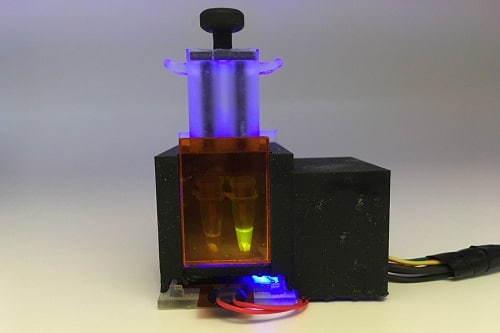The unique tabletop diagnostic device gives results in an hour and can be programmed to detect variants of the SARS-CoV-2 virus

The Delta variant is wreaking havoc on many nations that till now had contained the Covid-19 pandemic to a certain extent. Its emergence and rapid transmission pose a grave threat to suppressing this widespread disease.
Now engineers at MIT and Harvard University have designed a small tabletop device that can detect SARS-CoV-2 from a saliva sample in about an hour. The diagnostic claims to be just as accurate as the existing PCR tests. The device can also be used for detecting specific viral mutations linked to some of the circulating SARS-CoV-2 variants. Because the results can be obtained within an hour, the device is beneficial for much easier tracking of different variants, especially in regions not having access to genetic sequencing facilities.
The new diagnostic technique is based on a technology called Specific High-sensitivity Enzymatic Reporter unLOCKing (SHERLOCK), a tool that relies on CRISPR technology. The researchers designed the device, which they call minimally instrumented SHERLOCK (miSHERLOCK) so that it can have up to four modules that each look for a different target RNA sequence. The original module contains RNA guide strands that detect any strain of SARS-CoV-2. Other modules are specific to mutations associated with some of the variants that have arisen in the past year, including B.1.1.7, P.1, and B.1.351.
The device produces a fluorescent readout that can be seen with the naked eye. There is also a smartphone app that can read the results and send them to public health departments for easier tracking.
To achieve the quick results feature, the researchers incorporated a pre-processing step that disables enzymes called salivary nucleases, which destroy nucleic acids such as RNA. The device was first tested with human saliva spiked with synthetic SARS-CoV-2 RNA sequences and then with about 50 samples from patients who had tested positive for the virus. They found that the device was just as accurate as the standard PCR tests now used, which require nasal swabs and more hardware, thus taking more time to yield results.
“The ability to detect and track these variants is essential to effective public health, but unfortunately, variants are currently diagnosed only by nucleic acid sequencing at specialised epidemiological centres that are scarce even in resource-rich nations,” says Helena de Puig, a postdoc at Harvard University’s Wyss Institute for Biologically Inspired Engineering.
“Our platform can be programmed to detect new variants that emerge and we could repurpose it quite quickly,” says James Collins, the Termeer Professor of Medical Engineering and Science in MIT’s Institute for Medical Engineering and Science (IMES) and Department of Biological Engineering. “In this study, we targeted the U.K., South African, and Brazilian variants, but you could readily adapt the diagnostic platform to address the Delta variant and other ones that are emerging.”
The device could be produced at a nominal cost of US$ 2 to US$ 3 per device. If approved by the U.S. Food and Drug Administration (FDA) and manufactured at a large scale, this diagnostic technique could be useful for people to test at home or in health care centres in areas without widespread access to PCR testing or genetic sequencing of SARS-CoV-2 variants.







